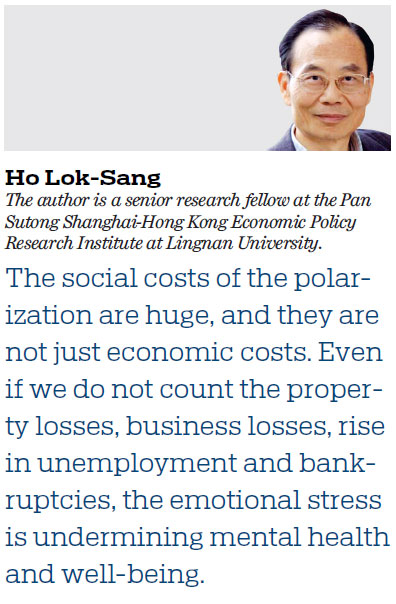Causes, costs, and cures of polarization in SAR
Updated: 2019-10-31 07:02
(HK Edition)
With few exceptions, we are living in an increasingly polarized world. In the United States, a Pew Research Center survey of 10,000 adults nationwide in 2014 showed that “partisan antipathy is deeper and more extensive than at any point in the last two decades.” An article in Chile Today, published March 16, was titled: “Collapse of the center: the polarization of Chilean politics.” An article in The Washington Post blared on May 21: “U.S.-style polarization has arrived in India. Modi is at the heart of the divide.” In Hong Kong, we have seen sharp divisions in political orientation boiling over into violent and vicious attacks – verbal, cyber, and physical. What is happening in Hong Kong, sadly, is much like what is happening in India as described in the Washington Post article – “In the seven-phase election that ended here Sunday (May 19), India’s politics have increasingly mirrored the United States: Every issue is filtered through a partisan lens, social media is the scene of rancorous exchanges, and disagreements over politics have strained relationships.” Even between husband and wife: “To Seema, Modi can do no wrong, but to Sanjive, he has done nothing right.”
Unfortunately, polarization is inevitable in the “democratic” world. Even in Europe, an article in Worldwide ERC on May 30 declared: “EU elections highlight political polarization throughout Europe.” Denmark, Sweden and other Scandinavian countries, best known for their high ratings in happiness and social safety nets, have suffered the same fate.

In a political system in which a power struggle determines who calls the shots, polarization is inevitable. In the “democratic” world, the power struggle is through the ballot box. Since the ballot box has been taken to define democracy, those who believe in “democracy” believe that with fear triggered and massive protests launched, now is their best chance to achieve “democracy”. The current power struggle in Hong Kong aims at bypassing the Basic Law to achieve “genuine democracy”. Because it aims to bypass the Basic Law, it is illegitimate. While the protesters criticize Beijing for “reneging on its promises to allow universal suffrage”, the fact is that “one country, two systems” is grounded on the Basic Law. The allegation that Beijing is undermining the “one country, two systems” principle is a lie because bypassing the Basic Law’s terms and conditions under which universal suffrage is to take place undermines “one country, two systems”.
The experience in the Western world shows that achieving “genuine universal suffrage” will not end the polarization, nor will it solve many of Hong Kong’s deep-seated problems. The Gini coefficient, household income distribution, in the United States rose to 0.49 in 2018, from 0.43 in 1990. Income inequality in the US had risen relentlessly over the past 30 years. An article in Statistica published on Aug 23 said: “Homelessness in the United States seems almost ubiquitous nowadays. It’s a problem without an easy solution, especially since the prosperity felt in the US over the past few years has left some of the country’s most vulnerable behind.”
The tragedy is that many Hong Kong people, especially among the young, have accepted the narrative that the ballot box defines freedom. Their fight for freedom, because it is wrong from the start, will never give them freedom. Now it is a fight between “freedom fighters” and those who want to abide by the Basic Law. If they got the ballot box they fought for, there will still be fights between one faction against another faction. Ballot-box politics is the use of everything lawful and unlawful to grab power through votes. But in many lands, in the final analysis, business interests hold sway. The 99 percent are left behind.
Why is polarization inevitable in countries that rely on the ballot box to elect their leaders and parliamentarians? The reason lies in the nature of representative democracy itself. Elected officials are accountable to their constituents, and constituents are mostly concerned with their own interests. With a term of office of four or five years, elected officials typically would prefer initiatives that offer short-term benefits to their constituents rather than those that promise long-term benefits to the country. In practice, in countries that practice ballot-box democracy, different interest groups fight for their different interests by electing those who represent their interests. That is why fighting climate change and rebuilding America’s much-deteriorated infrastructure are never on the top of the policy agenda.
The social costs of the polarization are huge, and they are not just economic costs. Even if we do not count the property losses, business losses, rise in unemployment and bankruptcies, the emotional stress is undermining mental health and well-being, and causing increases in suicides, family violence, and assaults.
What is the way out? I would advise that the world looks to Beijing for an answer. In China, leaders are selected based on merit and against key criteria that ensure that those at the top are not only capable but are also highly motivated to serve the country. More important, China holds its officials accountable, as noted by Singapore then-deputy prime minister and finance minister (now Senior Minister) Tharman Shanmugaratnam at the St Gallen Symposium in 2015.
(HK Edition 10/31/2019 page8)
